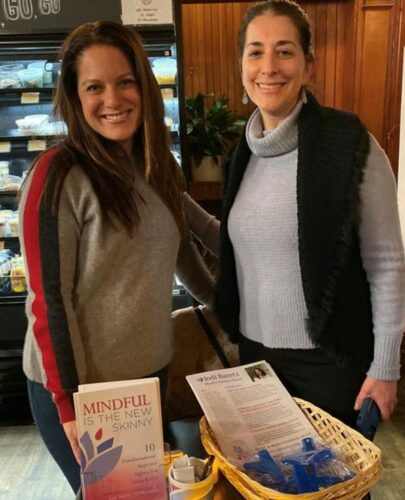How to Avoid Old Patterns and Create ‘Meaningful Dialogue’ During this Challenging Time

By Michelle H. Lewis, Esq.
These days, everyone is stressed and anxious. Fear for our health and the health of our loved ones, concern for our financial security, and uncertainty about the future are rampant. Our nerves are on edge, and there are reports of surging domestic violence, anxiety, insomnia, and depression as we struggle to right ourselves in these choppy seas. Raising children struggling to adapt to digital classrooms, coping with physical isolation from their peers, and dealing with the disappointments of cancelled parties and shuttered summer camps, presents an added complication for adults responsible for their care.
For divorced parents, there is yet another set of challenges. Former spouses are likely experiencing similar or even more challenging difficulties. Like most of us, former spouses may not be fully aware of the physical, emotional, or financial health of one another. Yet we still must support our children and safely transition them back and forth between two homes even when our patience is wearing thin.
This situation is ripe for conflict and is contributing to the many calls divorce attorneys are receiving to help navigate this increasing acrimony. Conflicts about differing levels of adherence to social distancing, disputes over the level of supervision children need in their digital learning, disagreements about the amount of screen time appropriate under the current circumstances, and about the content of that screen time abound. While these dilemmas are “day to day decisions,” which in most divorce agreements are to be decided by the parent charged with supervision of the children on any given day, they feel like “life or death” decisions with the potential for grave consequences for even the most minor mis-step. Courts are being asked to resolve conflicts about these issues by the dozens. But is the court system the right place to bring these conflicts?
Our normal manner of arguing leaves separated and former spouses furious and self-righteous. We assume we know what happened, and our point of view is the only “right” one. We also have a powerful tendency to believe we know the intentions of the person who “wronged” us, and inevitably ascribe evil intentions to them. When people in conflict are divorced, we fall into old patterns that reaffirm our ex’s deficiencies and confirm our cognitive biases of former spouses’ selfish and malevolent intentions. Adding fuel to the fire, when children are involved, parents may use arguments to subconsciously or deliberately play the victim or the “good parent” while vilifying the other parent.
How can we keep disagreements from blowing up into co-parenting disasters? There is a method of turning arguments into meaningful dialogues developed by lecturers at the Harvard Negotiation Project[1], whereby divorced or separated parents can turn destructive dynamics on their head and significantly improve their communication. This method can help parents in conflict shift away from ascribing blame and turn toward a stance of curiosity about what happened; to ask questions rather than jump to conclusions and to explore the motivations of the other parent before responding. To employ this method in your relationship, ask yourself these three questions next time you have an argument or want to prepare for a challenging conversation with your former spouse:
- What happened?
We tend to assume the answer to this question is obvious, and that we know what happened and why something went wrong. Imagine this example: Your ex-husband dropped off the kids over thirty minutes late on Sunday night, again. As he turned to leave after they rushed through the front door, you told him off for being “selfish and thoughtless, as always.” He gave you the finger and sped off. It is evident to you that he doesn’t care enough about their bedtime routines to get them home on time, and he certainly doesn’t care that you rushed back from the grocery store just to make sure you could be there in time. You muse that he probably brought the kids home late again just to get a rise out of you. He has no respect for you, for your feelings or for your time.
But what if your story about what happened is wrong? What if your ex was late because your six year old could not find her favorite stuffed rabbit “Bunny” when it was time to leave, and he spent half an hour on his hands and knees looking under every piece of furniture while she sobbed? What if you learned that something similar happens every time it is time to leave his home to return to yours?
If you can remember to ask what happened instead of jumping to blame, you might learn new facts– he was over 30 minutes late dropping off the kids, AND he spent 30 minutes looking for Bunny. More importantly, you will learn that despite the genuine negative impact on you – you rushed home only to sit around waiting – your former spouse lacked nefarious intent.
- Whose Fault Is It?
When a former spouse has done something that has hurt or angered us, and we are SURE that he or she did it on purpose (or at least carelessly), most of us are quick to ascribe blame. It is natural to assume that because your ex-spouse’s actions or inaction have negatively IMPACTED you, he or she must have INTENDED to cause that impact.
When we blame someone, we are passing judgment. Passing judgment on our exes can feel especially satisfying, yielding more evidence of their deficiencies and OUR justified anger. This is called “confirmation bias”.
After most divorces, there are strong feelings that underlie the judgments we make about our former partners. We usually blame them more than ourselves for the issues in the relationship that led to divorce. When something upsetting happens surrounding co-parenting, it retriggers intense feelings of anger, frustration, hurt, sadness, or even guilt. It is essential to recognize when this happens and to notice how feelings from the past can exacerbate our reactions. Becoming aware of these old patterns of blame is the first step toward avoiding discord in the future.
- How Might You Have Contributed to the Problem?
If we can learn to recognize that there are two sides to “What happened?” (and there are almost ALWAYS two sides), and we are prepared to admit that despite the negative impact of our ex-spouse’s actions, we cannot KNOW their intentions without asking, it is time to take a step back to examine our own actions. What could we have done differently? What did we do that might have made things worse?
Take the example above in which your ex-husband was late dropping off the kids. An expression of curiosity and genuine concern instead of reflexive blame might have forestalled an argument and a flip of the middle finger. There would have been room for a more constructive conversation, possibly leading to an improvement in co-parenting.
Imagine this time you DID ask what happened. After hearing about the long search for Bunny, you could let your ex-spouse know the impact on you. “You know, when you were late, and I was sitting here waiting after I rushed home to be in time for the girls, I was furious and frustrated.” You might also share that something similar often happens when you are trying to leave the house with the kids. Once your ex doesn’t feel attacked, he is much more likely to hear your concerns and to give you the courtesy of a call next time, or even to start the packing up process a little sooner.
Now more than ever, effective communication is critical for divorced couples with children. When so much of the ground beneath our children and us is shifting, developing better communication is the key to successful co-parenting and staying out of court. So next time your ex does something that leaves you seeing red, remember to stop before you act:
- Ask to hear their side of the story. Be curious.
- Ask why they acted the way they did; don’t assume bad intentions.
- Tell them about the impact on you but try to avoid blame.
- Ask yourself how your actions contributed to the issue. Engage in a conversation about both of your contributions to the problem.
If you can remember to plan for conversations that have the potential to turn into heated arguments using this simple guide, you will likely find your co-parenting relationship improves dramatically. Do we really need the court system for this?
[1] Difficult Conversations (1999) by Douglas Stone, Bruce Patton and Sheila Heen.
Michelle H. Lewis, Esq. is a partner with Kramer Kozek LLP focusing her practice on collaborative divorce, mediation, mediation review, and litigation since 2006. Building her reputation on settling high conflict and complicated financial matters, Ms. Lewis also serves on the Board of Directors of the New York Association of Collaborative Professionals and is a member of the Westchester Women’s Bar Association and the New York State Bar Association Family Law Sections. She is recognized as a New York Metropolitan Super Lawyer and received the Pro Bono Award from the Legal Services of the Hudson Valley in 2017.
Ms. Lewis graduated with honors from Harvard Law School, where she focused her studies on family law, negotiation, and divorce mediation. Prior to Harvard Law School, Ms. Lewis earned her undergraduate degree from Columbia College and a master’s degree from Yale in international relations. In 2003, Ms. Lewis earned two graduate certificates from New York University in life coaching and small business coaching. She has been a member of the bar of the State of New York for 22 years.
For additional information about Michelle or to learn more about Kramer Kozek LLP, their website is kramerkozek.com and the firm’s main number is 914-683-3500.

